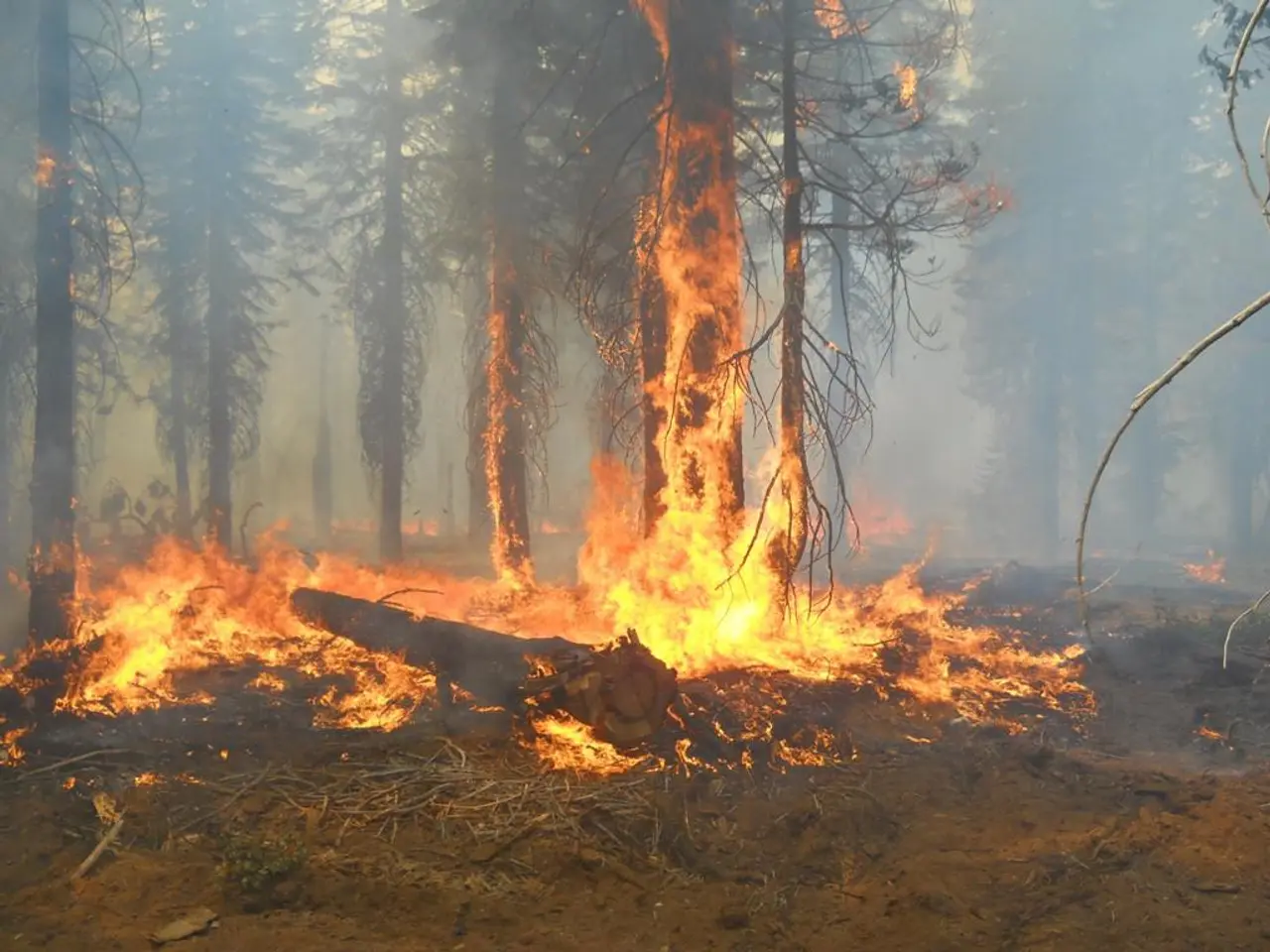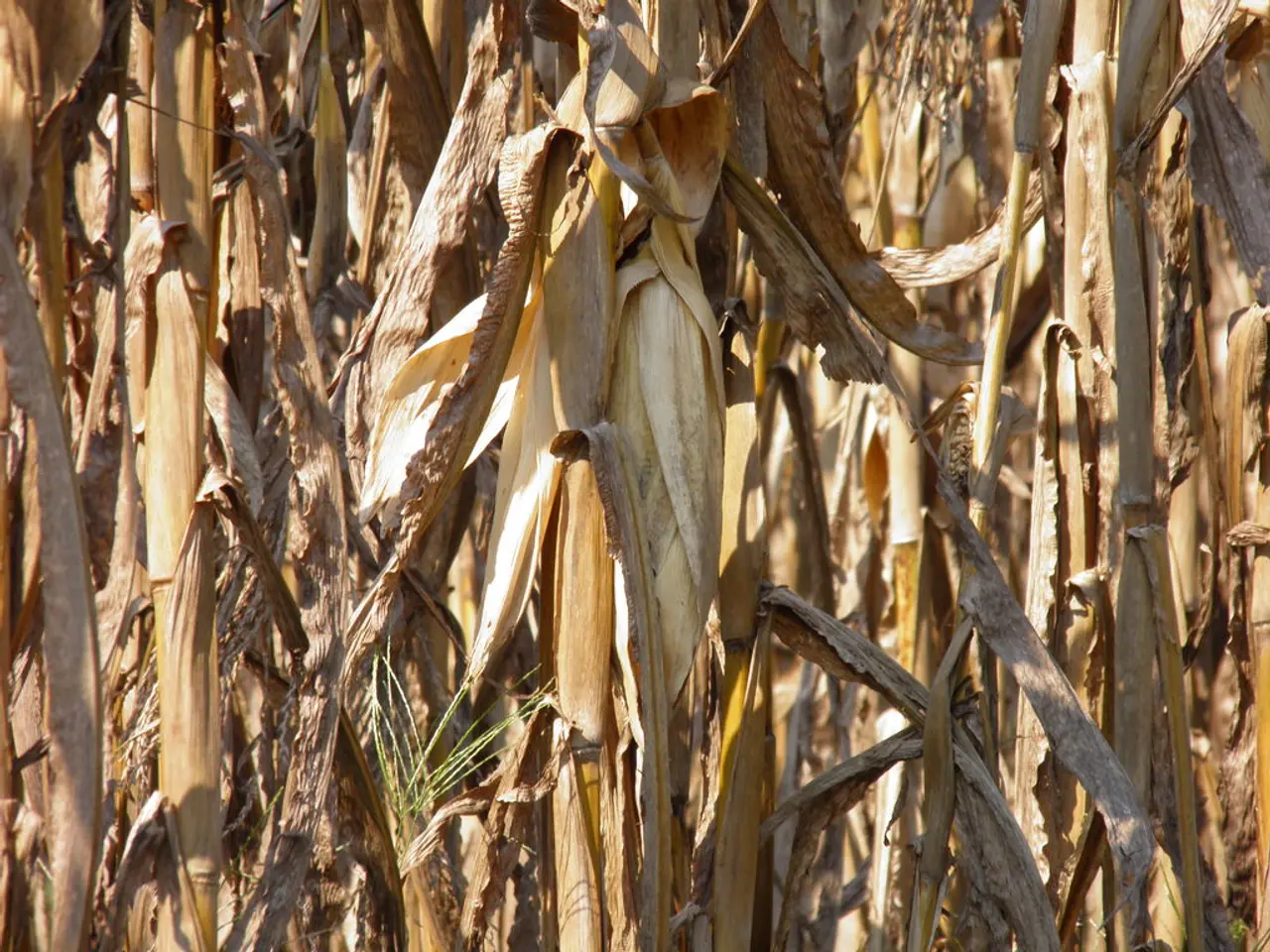Southern Europe and Turkey experience a reduction in fires, yet temperatures start to climb higher.
A new heatwave with temperatures above 40 degrees Celsius is expected in Portugal and neighbouring Spain, adding to the ongoing struggle against wildfires in the region. Since the beginning of the year, over 70,000 hectares of forest, bush, and farmland have been destroyed by fires in these countries [1][2].
The situation remains tense, especially in southern Portugal and Italy. Firefighters near Ponte da Barca are still battling a raging forest fire, while a second large fire near the Portuguese town of Arouca has been brought under control [3]. In Italy, more than 3,700 fires were registered by the local forest authority in Sicily between May and the end of July [4].
The Greek fire service is on high alert due to expected windy conditions in some areas. Strong winds are a nightmare for firefighters as they drive the flames forward and make extinguishing efforts much more difficult. However, firefighters in Cuevas del Valle, south of Ávila in Spain, received a much-needed helping hand from rain that almost completely extinguished the flames [5].
The ongoing forest fires in southern Europe, including Turkey, Greece, and Italy, are primarily driven by climate change-induced hotter and drier conditions combined with human activities. Increased atmospheric carbon emissions lead to hotter summers with less rainfall, drying out forests and making them more susceptible to fires [1][3]. Human activity is the main cause of ignitions, responsible for over 95% of the fires in these regions [2][4].
Measures being taken to combat wildfires emphasize a shift from reactive firefighting to proactive prevention and landscape management. This includes ecological restoration and nature-based forest management to make ecosystems more fire-resilient, such as replacing fire-prone exotic species with native, fire-adapted trees [2]. Community involvement and integrated wildfire prevention strategies are also crucial in reducing fire risk in vulnerable regions [2][4].
Policy calls by organisations like WWF and BirdLife Europe for governments to adopt long-term strategies focusing on fire risk reduction and ecosystem resilience instead of solely on extinguishing fires after they have started are gaining traction [2][4]. The aim is to shift the focus from firefighting alone to ecosystem restoration, nature-based management, and integrated prevention.
Unfortunately, the human toll of these wildfires is not insignificant. At least 14 people, including firefighters, have died in forest fires in Turkey this year [6].
In neighbouring Turkey, more than 2,000 forest fires have broken out so far this year [7]. Firefighters in Turkey have largely controlled forest fires, according to the state news agency Anadolu [8]. Isolated fires were reported in the rural regions of Thrace and Izmir, but were quickly extinguished [9].
As the battle against wildfires continues, it is clear that a comprehensive, long-term approach is needed to address the root causes and reduce the risk of these devastating events in the future.
References: [1] BBC News. (2022, August 15). Portugal heatwave: Temperatures set to hit 45C as wildfires rage. Retrieved from https://www.bbc.com/news/world-europe-62531749 [2] European Forest Institute. (2021, July 28). Wildfires in Portugal: The role of fire-adapted trees and ecosystem restoration. Retrieved from https://www.efi.int/global-policy/wildfires-portugal-role-fire-adapted-trees-and-ecosystem-restoration [3] European Commission. (2022, August 14). Portugal and Spain hit by wildfires amid heatwave. Retrieved from https://ec.europa.eu/commission/presscorner/detail/en/IP_22_3940 [4] WWF. (2022, August 12). Wildfires in Europe: A call to action for governments. Retrieved from https://www.wwf.eu/news/wildfires_in_europe_a_call_to_action_for_governments [5] Reuters. (2022, August 15). Wildfire in Spain's Cuevas del Valle almost completely extinguished by rain. Retrieved from https://www.reuters.com/world/europe/wildfire-spains-cuevas-valle-almost-completely-extinguished-rain-2022-08-15/ [6] Anadolu Agency. (2022, August 15). 14 people dead in Turkey's forest fires this year. Retrieved from https://www.aa.com.tr/en/todays-headlines/14-people-dead-in-turkeys-forest-fires-this-year/2555138 [7] Anadolu Agency. (2022, August 14). Over 2,000 forest fires break out in Turkey this year. Retrieved from https://www.aa.com.tr/en/todays-headlines/over-2000-forest-fires-break-out-in-turkey-this-year/2554977 [8] Anadolu Agency. (2022, August 15). Forest fires in Turkey largely controlled, according to state news agency. Retrieved from https://www.aa.com.tr/en/todays-headlines/forest-fires-in-turkey-largely-controlled-according-to-state-news-agency/2555155 [9] Anadolu Agency. (2022, August 15). Isolated fires reported in rural regions of Thrace and Izmir. Retrieved from https://www.aa.com.tr/en/todays-headlines/isolated-fires-reported-in-rural-regions-of-thrace-and-izmir/2555169
- The ongoing wildfires in Portugal and Spain, fueled by climate change-induced hotter and drier conditions, are not only causing extensive damage to the environment but are also a significant concern for science and environmental-science researchers.
- The weather forecasting community is closely monitoring the weather patterns in the region, as strong winds can exacerbate the spread of these fires, posing additional challenges for firefighters.
- The ongoing wildfires have also resulted in unfortunate incidents, with accidents and crimes-and-justice cases, such as arson, being reported in some regions.
- General-news outlets are reporting that these wildfires have devastated over 70,000 hectares of forest, bush, and farmland in Portugal and Spain, causing significant ecological damage and threatening local wildlife.
- Policy makers and organizations, including WWF and BirdLife Europe, are advocating for long-term strategies focused on fire risk reduction and ecosystem resilience, which would aid in reducing the frequency and severity of wildfires in the future.







